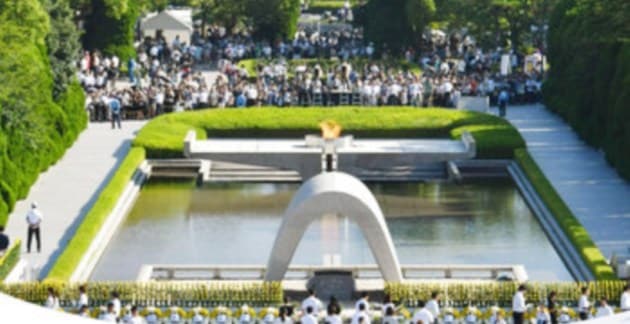Hiroshima Day: Survivors say ‘never again’, urge disarmament of nuclear weapons
To mark the 72nd anniversary of the world's first atomic bombing people offer prayers at the Peace Memorial Park in Hiroshima, western Japan.
August 6, 2017 11:24 IST 1 / 8
1 / 8It's been 70 years since Hiroshima witnessed the horror of an atomic bomb that rained destruction and killed 140,000 people. Everything had changed forever after the Hiroshima bombing in 1946. August 6 is remembered as a black day in history. Memories hold strong even after so many years. To mark the 72nd anniversary of the world's first atomic bombing people offer prayers at the Peace Memorial Park in Hiroshima, western Japan, Sunday. (Source: AP News)
 2 / 8
2 / 8Toshiki Fujimori, an atomic bombing survivor who is a top official at Hidankyo, a major Japanese organization for the survivors, stands in front of a painting of the Atomic Bomb Dome in Hiroshima, western Japan, ahead of the 72nd anniversary of the first U.S. atomic bombing. When the U.S. dropped the bomb on Aug. 6, 1945, Fujimori's mother was carrying him, then just a year old, piggyback to the hospital. The impact of the explosion threw them both to the ground, nearly killing him. (Source: AP Photo)
 3 / 8
3 / 8Hiroshima's appeal of "never again" on the 72nd anniversary has acquired renewed urgency as North Korea moves ever closer to acquiring nuclear weapons. (Source: AP Photo)
 4 / 8
4 / 8A woman is seen praying for the world's first atomic bombing victims while a man with a girl takes photos at the Peace Memorial Park in Hiroshima, western Japan. (Source: AP Photo)
 5 / 8
5 / 8Kim Ji Nho, a pro-Pyongyang ethnic Korean who was born in Hiroshima, speaks during an interview with The Associated Press in Hiroshima, western Japan. Kim, 71, is a "hibakusha," or atomic-bomb survivor, who was exposed to radiation when his mother, pregnant with him, went to the ruins of the city to search for a daughter who went missing in the blast. "We 'hibakusha' and our groups share a clear goal, which is to abolish nuclear weapons from the world," Kim said. "Nuclear weapons should never be used." (Source : AP Photo)
 6 / 8
6 / 8Organizers of a peace prayer event light up torches on floats on the Motoyasu River next to the Atomic Bomb Dome in Hiroshima, western Japan, on the eve of the 72nd anniversary of the first US atomic attack. (Source: AP Photo)
 7 / 8
7 / 8Taxi driver Tamio Ishida, whose father survived the August 6, 1945 atomic bombing as a teenager, stands by his car in Hiroshima, western Japan, ahead of the 72nd anniversary of the bombing that killed 140,000 people. "What if that young (North Kore) leader (Kim Jong Un) pushes a nuclear weapons launch button? I think neighboring Japan has a risk of being hit," said Ishida, 59, whose father was a survivor. "I think tensions have risen and many people in Hiroshima share a sense of urgency." (Source: AP Photo)
 8 / 8
8 / 8Taxi driver Tamio Ishida, whose father survived the Aug. 6, 1945 atomic bombing as a teenager, stands by his car in Hiroshima, western Japan, ahead of the 72nd anniversary of the bombing that killed 140,000 people. "What if that young (North Kore) leader (Kim Jong Un) pushes a nuclear weapons launch button? I think neighboring Japan has a risk of being hit," said Ishida, 59, whose father was a survivor. "I think tensions have risen and many people in Hiroshima share a sense of urgency." (Source: AP)











